Science fiction – or more accurately, speculative fiction – has a rich tradition of exploring What if... scenarios, exploring alternative paths of important historical events, asking questions such as, “What if the South had won the Civil War?” or “What if America had lost World War II?”
 Just a few of the multitude of novels diving into divergent paths for the American Civil War include Harry Turtledove’s The Guns of the South, Terry Bisson’s Fire on the Mountain, and Ward Moore’s Bring the Jubilee. The recent, best-selling Underground Airlines by Ben H. Winters posits that the Civil War never happened and slavery persists in regions of America. Even politician Newt Gingrich has written in this genre: his novel Gettysburg, co-written with William R. Forstchen, explores how history might have unfolded if the Confederacy had won this crucial battle. In a more outlandish speculation, William Forstchen’s Lost Regiment series, beginning with Rally Cry, envisions a Civil War era Union regiment transported through time and space to an alien world.
Just a few of the multitude of novels diving into divergent paths for the American Civil War include Harry Turtledove’s The Guns of the South, Terry Bisson’s Fire on the Mountain, and Ward Moore’s Bring the Jubilee. The recent, best-selling Underground Airlines by Ben H. Winters posits that the Civil War never happened and slavery persists in regions of America. Even politician Newt Gingrich has written in this genre: his novel Gettysburg, co-written with William R. Forstchen, explores how history might have unfolded if the Confederacy had won this crucial battle. In a more outlandish speculation, William Forstchen’s Lost Regiment series, beginning with Rally Cry, envisions a Civil War era Union regiment transported through time and space to an alien world.
 But science fiction more often projects into the future. Something deeply human keeps us both fascinated and worried about tomorrow’s dangers. Several recent novels have foreshadowed a possible – and plausible – hot phase of the recurring American Civil War. I’ve written extensively about what I view as ongoing Phases of our American Civil War; luckily most segments of this persistent animosity have been tepid or cool, though the 1860s fever was near devastating. Indeed, I fear, with current tensions, the possibility that something could go volcanic. This was portrayed – in retrospect – by my post-apocalyptic novel The Postman, which has been receiving a surge of attention lately, for its depiction of “holnists” whose rationalizations sound very much like those of Steve Bannon.
But science fiction more often projects into the future. Something deeply human keeps us both fascinated and worried about tomorrow’s dangers. Several recent novels have foreshadowed a possible – and plausible – hot phase of the recurring American Civil War. I’ve written extensively about what I view as ongoing Phases of our American Civil War; luckily most segments of this persistent animosity have been tepid or cool, though the 1860s fever was near devastating. Indeed, I fear, with current tensions, the possibility that something could go volcanic. This was portrayed – in retrospect – by my post-apocalyptic novel The Postman, which has been receiving a surge of attention lately, for its depiction of “holnists” whose rationalizations sound very much like those of Steve Bannon.
 One novel I’ve touted lately is Tears of Abraham, by Sean T Smith, which chillingly takes you toward a disturbingly hot second Civil War, a deadly struggle of countryman against countryman. What would happen if the U.S. split apart into warring states — set off by a far-reaching conspiracy? A president who declares martial law as states take steps toward secession. This page turner offers vivid, believable action and characters, along with sober, thoughtful insights into what it may mean — when the chips are down — to be an American. What divides us… and what unites us?
One novel I’ve touted lately is Tears of Abraham, by Sean T Smith, which chillingly takes you toward a disturbingly hot second Civil War, a deadly struggle of countryman against countryman. What would happen if the U.S. split apart into warring states — set off by a far-reaching conspiracy? A president who declares martial law as states take steps toward secession. This page turner offers vivid, believable action and characters, along with sober, thoughtful insights into what it may mean — when the chips are down — to be an American. What divides us… and what unites us?
This seems particularly relevant considering the deep divides across America during the election cycle of 2016, where Red States and Blue States were more bifurcated than ever, seemingly unable to fully comprehend the opinions and problems of their own neighbors.
 Another science fiction vision that came to mind, given evidence of recent efforts by foreign powers to sabotage our democracy and economy, is The Cool War, published by science fiction master Frederik Pohl back in 1981. This tale portrays ongoing slow-simmering international tensions, a series of shadow wars where rival countries seek to sabotage the economy and markets of their enemies — and allies. In fact, I deem no novel to be of more immediate pertinence to any member of our defense and intelligence communities.
Another science fiction vision that came to mind, given evidence of recent efforts by foreign powers to sabotage our democracy and economy, is The Cool War, published by science fiction master Frederik Pohl back in 1981. This tale portrays ongoing slow-simmering international tensions, a series of shadow wars where rival countries seek to sabotage the economy and markets of their enemies — and allies. In fact, I deem no novel to be of more immediate pertinence to any member of our defense and intelligence communities.
Wars, cool, cold or hot? David Rothkopf, editor of Foreign Affairs, distinguishes them, commenting, “The purpose of the Cold War was to gain an advantage come the next hot war or, possibly, to forestall it. The purpose of Cool War is to be able to strike out constantly without triggering hot war, while making hot wars less desirable (much as did nuclear technology during the Cold War days) or even necessary.”
 In a similar vein, the near-future thriller Ghost Fleet: A Novel of the Next World War by P.W. Singer and August Cole envisions a revived Cold War, with rising tensions between the United States, China and Russia. An all-too believable war played out not just on land and sea, but also in space and cyberspace.
In a similar vein, the near-future thriller Ghost Fleet: A Novel of the Next World War by P.W. Singer and August Cole envisions a revived Cold War, with rising tensions between the United States, China and Russia. An all-too believable war played out not just on land and sea, but also in space and cyberspace.
Returning to parallel universes, Philip K. Dick’s alternate history of World War II, The Man in the High Castle — follows a scenario where the Nazis have won the war; it has been vividly adapted in the recent television series of the same name by Amazon. I’ve also explored that dark aftermath where the Nazis won World War II in my graphic novel, The Life Eaters. Connie Willis has revisited World War II in her novel, Blackout. Three time travelers find themselves stranded in London during the Blitz, facing air raids and bombing raids.
Another book just hitting the shelves – American War by Omar El Akkad – is a dystopian novel about a Second American Civil War breaking out in 2074. The United States has been largely undone by devastating ecological collapse, a presidential assassination, the onset of a virulent plague arising from a weaponized virus, and a militantly divided North and South. The novel vividly portrays a doomed country wracked by vicious guerrilla raids, refugee camps interning displaced citizens, accompanied by relentless violence and death.
Whew! One can only hope that dark visions from these nightmarish scenarios might serve as self-preventing prophecies — much as George Orwell’s prophetic 1984 girded many to fight against the rise of any possible Big Brother to their last breath. Can we resist the divisions that threaten our country?
Indeed, our civilization’s ultimate success may depend on our foresight — perceiving potential problems we are able to navigate, mistakes we manage to avoid. Science fiction has often served to shine a light to reveal possible — and catastrophic — pitfalls in our shared future.
Warnings we would be wise to heed… and wounds we would be wise to heal.


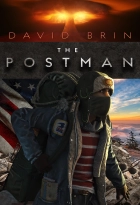

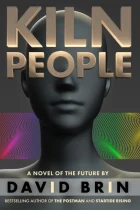

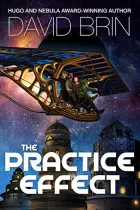




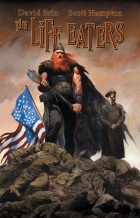
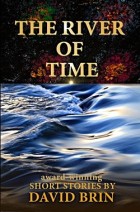


The Clockwork Century series by Cherie Priest has an interesting take on the Civil War and The Republic of Texas and don’t forget the zombies!
That’s a provocative linkage between US history and imagined futures. Thanks – a good pointer to reading, and a fine spur for thinking.
Lately I’ve become very leery of the Zombie genre, because what it seems to do is prepare us for mass slaughter of immigrants created by climate change; there will be large groups of displaced people, dressed in rags, many sick, who will need to be housed and fed and treated with compassion as sea levels rise, and the zombie genre dovetails with a love of gun culture to provide this other scenario, of vigilante mass slaughter. I have loved the post holocaust stuff I’ve read all my life, but as climate denial becomes the stated policy of the worlds wealthiest and most powerful country and as a piece of ice the size of rhode island prepares to drop from antartic shelf, I find myself worried, that a generation of angry, underemployed first person shooter fans will one day use their zombine hunting skills on refugees.
Good point, Jay.
There’s something very powerful about the zombie member appearing as our anxieties about income inequality soar.
Pingback: Spekülatif Kurguda Amerikan İç Savaşı – Mugene.net